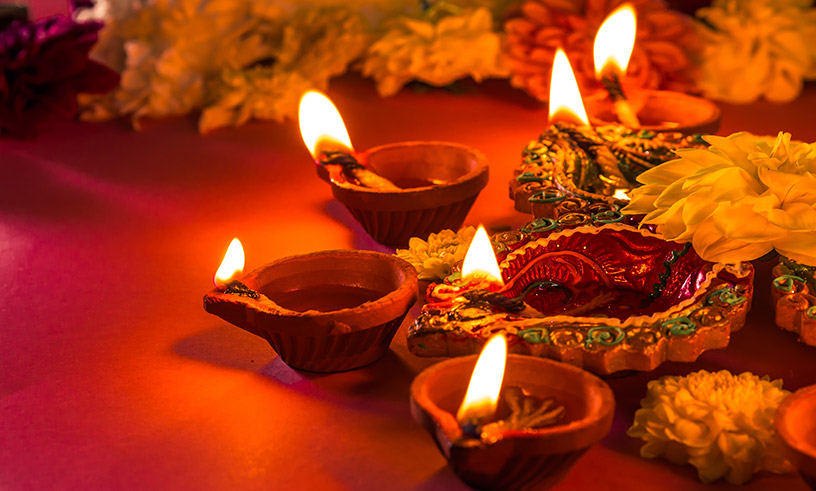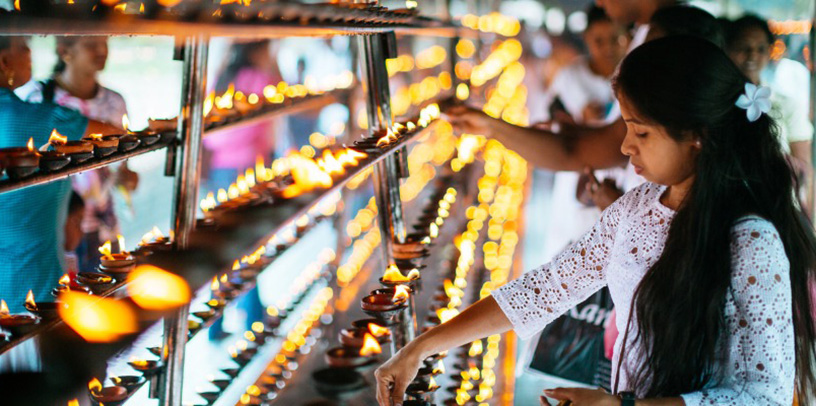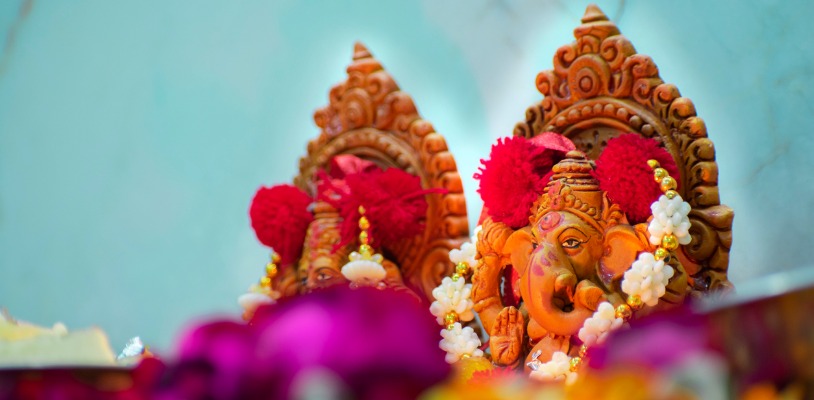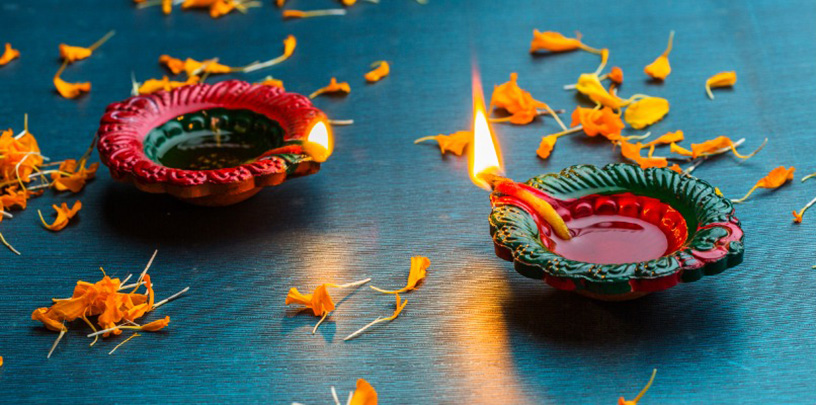Ultimate Travel Guide to Diwali Festival
Are you planning on travelling through India for the Diwali festival this year? Or perhaps you’re an Indian returning home for your first Diwali experience? Whatever your reasons for celebrating this special Festival of Lights, prepare to be amazed during this magical annual experience.
Skip ahead to read:
- What is Diwali?
- When does Diwali take place each year?
- What are some typical Diwali traditions?
- How do people celebrate Diwali?
- What is eaten during Diwali?
- What Indian religions celebrate Diwali?
- Where is Diwali celebrated in India?

Consider choosing Cover-More travel insurance to protect your trip to India.
What is Diwali?
Diwali is a five-day celebration of new beginnings. Celebrated by Hindus, Jains, Sikhs as well as some Buddhist, the festival represents good overcoming evil and light triumphing over darkness. This is why the celebration was given the name the ‘Festival of Lights’. Additionally, Diwali is a name derived from Sanskrit texts and the word Deepavali, which literally means ‘rows of lighted lamps’.
During Diwali, you will find shops, homes, and buildings decorated in twinkling lights that shine bright during the darkest days of the year.
When does Diwali take place each year?
The date of Diwali changes each year because the main day of the festival is determined by the cycle of the moon in accordance with the Hindu lunar calendar.
The climax of Diwali, which lands on the third day of the festival, occurs on the darkest day of the year.
Additionally, Diwali is chosen to be held on the 15th day of Kartik, which is considered the holiest month within the Hindu lunar calendar. Though the dates differ year by year, the festival typically takes place within either October or November.
This year, the main Diwali event will be held on October 27, 2019. But it’s important to note this holiday will be observed a day earlier in South India on October 26.
The festival itself is celebrated across five days, with the first day this year beginning on October 25.
In 2020, the main Diwali day will be on November 14th, while in 2021 it will fall on November 4th.

When you're travelling for Diwali, find out the best beaches to visit in India!
What are some typical Diwali traditions?
It is traditional during Diwali to adorn your home and work areas with little electric lights or even oil lamps in order to create a feeling of light, and goodness, being spread far and wide.
Candles are often put into bowls of water and bob on the surface, while decorated festively with flowers. Beautiful artworks are created by scattering coloured rice or powder in patterns along the floors.
It is important for those celebrating Diwali to clean their homes and gardens from top to bottom before the celebration begins. This is to mark the ‘new beginning’. People also take care to clean themselves by washing carefully with water and using fragrant oils and perfumes.
For some, it is a time to buy new clothes and give presents of sweets to family, friends and colleagues. It is also tradition to seek out those in need and donate money, food and other offerings to people less fortunate.
In many towns and cities, festivals called Melas are also held in the streets. Melas, while often seen throughout India, also take place in various countries and cities around the world. Mela celebrations are a way for the Indian community to connect with their cultural roots and heritage during the Festival of Lights.
How do people celebrate Diwali?
Throughout India, almost everyone gets into the spirit of Diwali during the festival. All homes, shops and town squares are covered in little ‘diya’, or oil lamps, to create beautiful sprinkles of light in the evening. Kids also join in on the festivities as it often involves consuming a lot of tasty sweets and setting off colourful fireworks!
Quite often international travellers will head to India during Diwali either to reunite with family members or to enmesh themselves in the customs and traditions of a new culture.

Love experiencing something new? Take a walk on the wild side and partake in India's Holi Festival!
What is eaten during Diwali?
The main food of Diwali is sweets, which come in a variety of different tastes and colours.
During Diwali, many families will eat out, delighting in the traditional foods of rich, savoury and sweet dishes. Many families will also choose to prepare lavish home-cooked meals and invite guests over to share in both the food and the festivities.
It is common for families and friends to exchange presents during these feasts, similar to what Christians do at Christmas time. Rather than a traditional Christmas pudding or roast turkey however, it’s common for each family to have their own unique dish that they cook during the time of Diwali.
Which Indian religions celebrate Diwali?
The three religions celebrating Diwali include Hindus, Sikhs and Jains. Each religion celebrates this festive time with different stories and historical events.
For example, Hindus worship Lakshmi, the Goddess of Wealth, praying for happy blessings for the coming year. They also welcome the return of their deities, Rama and Sita, to Ayodhya after they were exiled for a 14-year period. During this time, Hindus celebrate the day a demon named Mahisha was defeated by the Mother Goddess Durga.
For Sikhs, they celebrate a different story – the day their sixth guru Hargobind Singh was released from prison in 1619. However, even before Sikhs began taking part in Diwali, they were celebrating this marked event.
Jains also have a different cause for celebration. For Jains, they recognise Diwali as a time to remember the moment their God reached nirvana, otherwise known as Moksha, a state of eternal bliss.
Some Buddhists also choose to celebrate Diwali.

Want more travel tips and tricks like this? Head over to our travel blog for the latest!
Where is Diwali celebrated in India?
If you plan on travelling within India in order to celebrate Diwali, it’s probably best to avoid Kerala as it is the only state in India where Diwali is not celebrated.
The state of Kerala has its own strong traditions and customs that it has honoured for hundreds of years, so it leans away from the Festival of Diwali as it is not a part of these customs.
Aside from Kerala, Diwali is celebrated throughout the whole of India and is observed as a public holiday. This means that government buildings are closed, and stores may also shut or have reduced hours.
Public transport is rarely affected as many locals rely on transport during this time to visit their families and friends. However, we do recommend checking with transport authorities or your travel agent before you make travel arrangements during this busy time.
Let the festivities commence
Diwali is a special and uniquely wonderful celebration that all people, ethnicities and religions can take part in. Although its genesis and tradition lie within the Indian community, the principles of generosity, kindness and connection resonate throughout all groups. If you are able to travel to India and celebrate this holiday, or even find a local festival, you will certainly be glad you did.
Before you head off on your next adventure, be sure to protect you and your trip with travel insurance. Get a free online travel insurance quote today.